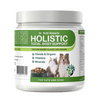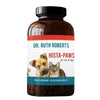Ensuring vitamin stability in pet food is vital for maintaining its nutritional value and health benefits. These essential micro-nutrients play a key role in your pet’s immune system, metabolism, and overall well-being. Yet, vitamins are highly susceptible to degradation from processing methods, storage conditions, and certain additives. To keep these nutrients effective, it's important to use strategies that minimize their loss. Let's learn more about some best practices that can help ensure vitamins remain potent and effective in your pet food.
Pet Food and Vitamins: What You Need to Know
Balanced nutrition is crucial for pets as it ensures they receive all the necessary nutrients required for their overall health and well-being. Vitamins play a pivotal role in maintaining various bodily functions, including immune system support, vision, bone health, and metabolic processes. Each vitamin contributes uniquely; for instance, Vitamin A supports vision and immune function, Vitamin D aids in calcium absorption for strong bones, and B-vitamins are essential for energy metabolism.

Without a well-rounded diet rich in essential vitamins, pets are at risk of developing deficiencies that can lead to severe health issues, highlighting the importance of providing them with nutritionally complete and balanced food.
Factors Affecting Vitamin Stability in Pet Food
Maintaining vitamin stability in pet food is crucial for ensuring pets receive the full nutritional benefits intended by the diet. However, several factors can compromise the integrity of these essential nutrients. This section explores the critical elements affecting vitamin stability, backed by scientific studies, and offers practical insights to ensure your pet's food remains as nutritious as possible.
Processing Methods
Preheating and Drying/Shaping Stages: Significant vitamin A loss occurs during these stages, with losses around 26% and 34%, respectively. (Study on vitamin A stability in dog food)
Extrusion Process: Vitamins A, D, E, K, C, and folic acid are most sensitive to the effects of extrusion, impacted by screw speed, die diameter, and feed rate. (2021 research paper)
Storage Conditions
Long-Term Storage: Vitamin E is especially sensitive to long-term storage. Some vitamins, like vitamin B6, are more impacted by the actual processing stages than storage time.
Environmental Factors: Temperature, humidity, and light exposure influence vitamin stability. High temperatures and humidity can degrade vitamins, while UV light breaks down vitamins like A and riboflavin (B2). (Study on vitamin A stability in dog food)
Additives
Additives encompass a wide range of substances added to pet food to enhance flavor, texture, appearance, and nutritional value. In this context, oils are often used as carriers for fat-soluble vitamins, to improve palatability, or to provide essential fatty acids.
Type of Oil: This can affect the stability of specific vitamins under certain conditions, such as pantothenic acid (B5). (Research published in Translational Animal Science)
Storage Practices
Proper Premix Storage: Vitamin A in premix storage remains stable over 180 days, showing no major losses, indicating that proper storage can maintain stability. (Study on vitamin A stability in dog food)
Heat and Time Exposure
Processing Stages: Mixing, heating (extrusion), and forming kibble shapes (granulation) contribute to vitamin loss, with longer exposure leading to greater degradation. (Research on vitamin loss during processing)
What This Means for Pet Parents?
Understanding how vitamins degrade during pet food processing and storage can significantly impact how we care for our pets' nutritional needs. By being aware of the factors that affect vitamin stability, you can take practical steps to ensure your furry companions receive the full spectrum of nutrients they need for optimal health. Here's some key takeaways:
- The study showed that most vitamin A in dog food remains stable during storage, except for losses during the hot drying process. However, improper storage can lead to further vitamin loss. Factories store vitamin premixes in cool, dark places with tightly sealed containers to preserve their potency. You can do the same at home: keep your dog's food in a cool, dry spot and seal the container tightly after each use to maintain vitamin levels.
- Some dog food companies put extra vitamins in their food and cook it carefully to keep those vitamins from disappearing. These might be a good choice for your dog.
- Home-cooked food: If you're not sure about store-bought food, you can always cook for your dog yourself! Use gentle cooking methods that don't involve a lot of heat, and choose ingredients that are naturally packed with vitamins. This way, you can create meals your dog will love that are also good for them!
- Dogs may need supplements to fill nutritional gaps, support specific health needs, or improve overall well-being. Supplements can provide extra vitamins, minerals, and other nutrients that might be lacking in their regular diet, helping them stay healthy and active. Essential nutrients like vitamin A, crucial for their health and might help fill dietary gaps. For more on vitamin A's importance, check out our article. Always consult your vet before adding new supplements to your dog's diet.

Final Thought
Ensuring our furry companions get the right nutrients from their food is a crucial part of our care routine. The latest research sheds light on how vitamins, particularly vitamin A, fare in commercial pet food. While the studies reveal some loss of vitamin A during food processing, especially when exposed to heat, there's good news too. Most vitamins in pet food tend to hold up well during storage, provided we store their meals in cool, dry spots and seal them tightly.
For us, this means paying a little extra attention to how we handle our pets' food at home. Simple steps like storing their kibble properly and considering vitamin supplements as a backup plan can go a long way in keeping our pets' diets balanced and nutrient-rich. And if you're feeling adventurous in the kitchen, whipping up homemade meals with vitamin-packed ingredients can be a delightful treat for your furry friends. Ultimately, it's all about giving our pets the best chance at a healthy and happy life. With a bit of knowledge and care, we can ensure they're getting the vitamins they need to thrive and wag their tails with joy!











